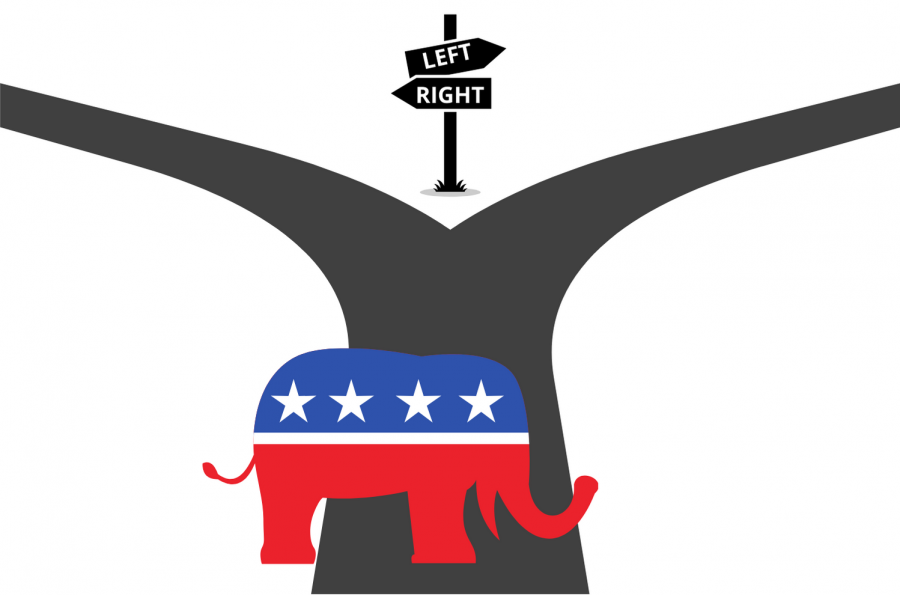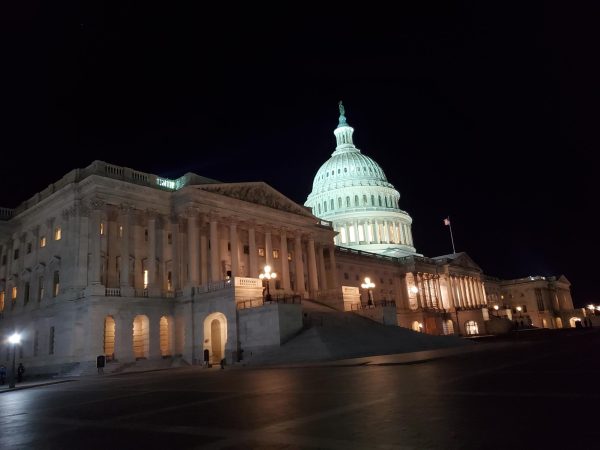What comes next? Campus conservatives reflect on GOP’s future relationship with Trump
What’s in store for the future of GOP as Trump leaves office?
Micah Watson, professor of political science and director of the politics, philosophy and economics program, alongside campus TPUSA leader Stephanie Robinson and Calvin Republicans leaders Marian Henderson, Maxim Ziskie, Adam Zentner, Steven Spayde and Paul Dick, shared with Chimes their thoughts on the struggles and possible triumphs to come for the Republican party after the Trump administration.
Chimes: Do you see the Trump administration as a culmination or a departure from the course of the Republican Party over the last few decades?
Watson: In some ways many of President Trump’s policies, or the policies his advisors were allowed to pursue, reflected pretty standard Republican priorities: rolling back overregulation, appointing originalist-leaning judges, issuing executive orders that reflect more conservative principles. And Yuval Levin (perhaps the sharpest conservative thinker around) observed recently there has always been a populist streak in the GOP, a streak in tension with the conservative streak…In that sense the Trump years reflected elements of the GOP that have been there for some time.
In other ways of course it’s been a significant departure, some in policy terms and approach (tariffs, praise of dictators) but primarily in personality or leadership style…those elements of Trump’s presidency do not reflect historically the mainstream of the Republican Party.
Calvin Republicans: He had a successful four years in office, but a political party is more than one person. We must continue to move forward.
Robinson: The Trump administration is a culmination of years of the American people feeling betrayed by establishment politicians on both sides of the aisle who are all talk and no action. The American people saw Trump as someone who was unafraid to stand up to the establishment and unafraid to, in his words, “drain the swamp.”
Chimes: From your perspective, has the GOP been too loyal to Trump? Not loyal enough?
Watson: I think the GOP as a party has been too loyal to Trump, and every time he crossed some line…the GOP’s tacit acceptance of his behavior only emboldened him in the future.
Calvin Republicans: Those within the Legislative branch do not have to swear loyalty and agreement to every one of the president’s policies and stances.
An elected official, regardless of party affiliation, must first base votes on the needs of the people in the area he or she is elected to represent, and on his or her own convictions.
Robinson: The GOP should be grateful for Trump. He did more for the GOP than most presidents in recent history.
Chimes: How do you think the events of January 6th impacted the public image of the party? Is that image accurate? If not, is there a way to replace or negate that image?
Watson: If the GOP can disentangle itself from the conspiracy fringe that grew in strength during the Trump years, then I expect that January 6th will be remembered as a terrible day and a warning about what happens when we put in power a figure whose language and messaging is recklessly careless at best and malignantly dangerous at worst.
Calvin Republicans: The events of January 6, 2021 were inappropriate and inexcusable. They were not an accurate reflection of the Republican Party. The GOP stretches beyond those who stormed the Capitol. The actions of a few should not represent the whole GOP. We reject all forms of violence, no matter what side of the aisle the acts are associated with.
Robinson: As someone who was in DC on January 6th, I can honestly say that the day was mis-portrayed by the media. Before the Capitol incident took place, it was beautiful to see people of every race, religion, age, and socioeconomic status gathered in unity to peacefully support President Trump. The small percentage of people who stormed the Capitol were first not all Trump supporters and second were not representative of most of the people gathered in DC that day. The Republican Party is the party of law and order. Unlike Democrats who only condemned the Capitol violence, Republicans condemned the Capitol violence and the Black Lives Matter/Antifa violence. The Black Lives Matter/Antifa violence was significantly more damaging than what took place on January 6th.
Chimes: What happens in 2024? Who do you see doing well in the Republican primaries and why?
Watson: What happens in 2024 depends a great deal on 2022. If the GOP is serious about competing again nationally, then it needs candidates who can appeal to the middle of the country…[Trump] addressed some issues that both parties had ignored. He gave voice to a frustration that many Americans feel, a sense that they’ve been passed over.
The GOP will need someone who 1) can speak to the legitimate concerns that helped Trump get in power without his debilitating persona, 2) project an aura of governing competence, and 3) energize conservative voters while still appealing to moderates. [Nikki] Haley and [Tim] Scott both fit that bill, among several other figures. It will be interesting to watch.
Robinson: In 2024, Trump could run again. If he does not, I could see other strong conservative leaders like Ron DeSantis or Kristi Noem run. Founder of BLEXIT, Candance Owens, also recently tweeted that she would consider running for president. I think Republicans do have a chance at winning after they see the Biden/Harris administration take an “America last” policy position.
Chimes: On the state level (or even county level), should Republican leaders distance themselves from loyalty to Trump or is the Trump voting base their best shot at reelection?
Watson: Many Republicans will need to perform a balancing act in which they distance themselves from the more controversial elements of the Trump experience without alienating those who supported Trump because they thought he was their best bet for moving the country forward (or preventing it from lurching leftward)…Super Trumpy districts will be safe for Trump acolytes, but their reach into national politics will be limited I suspect.
If “should’ means morally should, then no, my view, as a conservative, is that it’s not worth winning an election if the cost is trading my integrity and conservative principles by attaching myself to someone who has neither.
Calvin Republicans: The Michigan State Legislature should focus on how our governor is currently handling the pandemic. Instead of worrying about reelection and voting bases, the focus should be on getting Governor Whitmer to be more transparent and open with the “science,” data, and metrics she is using to base her decisions. The focus should be on getting this pandemic under control and reopening Michigan in a safe, efficient, and equitable manner.
Chimes: Is there a division between established Republicans and so-called “Trump Republicans”? Is there a way to repair that divide?
Watson: Yes, definitely a difference between “establishment” Republicans and Trump Republicans. The perceived ineptitude of the former is what fueled the rise of the latter. Some of that perception is justified, but governance is more difficult than it looks, as the Trump Republicans found out these last four years. I expect the only way to repair the divide is the greater fear of the prospects of a near-permanent Democratic majority.
Chimes: Now in the minority in both the senate and the house, how do Republicans balance sticking to their ideological guns with the need to compromise? Is the call for unity real/practical?
Watson: Republicans should work across the aisle where they can, and fight the good (political) fight when they can’t. Some areas have some bipartisan potential, like criminal justice reform and foreign policy. In other areas compromise doesn’t make much sense for either party, and that’s okay. It’s just politics. If we characterized a Democratic policy position as wanting to go to Massachusetts, and the Republican view on the same policy is akin to going to California, it doesn’t make sense for either party to suggest Missouri as a compromise.
Calvin Republicans: The need for unity in this country is greater than ever. However, unity does not mean always agreeing. Unity means being open to compromise and respectful negotiation.
Robinson: I personally believe that a commitment to values, principles, and truth is more important than compromise. We especially cannot compromise on truth.
When the left calls for unity, it is a call for conformity. With significant ideological differences on almost every major issue (ex. abortion, immigration/borders, free speech), unity between the parties does not seem realistic.
Chimes: There’s been a lot of media attention surrounding young Christian voters becoming less conservative. Do you think that is accurate?
Watson: I think we’ll have to get away from the smoking wreckage of the end of the Trump presidency to find out whether young people’s ambivalence about conservatism is substantive or linked to the Trump presidency.
Robinson: From my perspective, young evangelicals and Catholics becoming more progressive is the result of a diversion away from Biblical Truth. It is also the result of false teachings in the church by “woke” pastors and the result of conforming to the world.
Organizations like Turning Point USA, Turning Point Action, the Leadership Institute, and PragerU can help share conservative principles with young people.












Kate • Mar 5, 2021 at 11:44 am
It concerns me how many Calvin students are calling for the silencing of conservative voices, but it’s not surprising given the current political climate. Calvin is a place where you’re called to think deeply. If we immediately get defensive when hearing a viewpoint we don’t like, we’ll never be able to have a discussion or think deeply/critically. Do you ever try to understand how we got to a Trump presidency? And I mean TRULY understand by listening to conservatives (if you have any conservative friends anymore, have you had a calm discussion with them?) If your response is to say that Trump was elected because we live in a systemically racist country and this was just white America punishing everyone for the Obama years, then you’re not listening to what conservatives are saying.
From my perspective, conservatives are used to Republican leaders not standing up for their beliefs. We’re told to be quiet, just vote. And we’re tired of that. We’re tired of the culture war and cancel culture (do we really want a world where we judge people by their worst moments?) Personally, I’m tired of seeing people I have known for years post on social media about how morally inferior conservatives are, knowing that they would never say any of this to my face. They would never have a rational discussion with me about my beliefs. Who knows, we may find we agree on some things.
Conservatives are tired of being told that they’re racist, bigoted, homophobic, transphobic, xenophobic, etc for disagreeing with anything the left believes. That’s part of the reason why Trump was elected. Donald Trump became a giant middle finger for all conservatives who are fed up.
If you’re calling on the Chimes to apologize for posting this and/or think conservatives should be shut out of the public square, then you’re part of the problem.
I truly believe we all want what is best for the country, but we have vastly different ideas on how to get there. This isn’t new. Instead of trying to jump down one another’s throats, can we bring back civil discussion?
Kate • Feb 20, 2021 at 7:12 pm
I have to agree with pretty much everything Ellie Jones said. Presenting different voices together allows you to make a more informed decision about which voices are worth listening to and which aren’t. That’s the whole idea of free speech, right? People can speak their ideas, but their ideas are going to be countered and challenged–and, ideally, society can weed out the bad ones and make some progress toward truth and goodness. Granted, being published in a campus newspaper is a step beyond just speaking freely, but it’s not as if this were some TPUSA propaganda article. I’m not a conservative, but it was really nice to see that there are rational forms of conservatism (thanks, Professor Watson) that are incredibly different from the TPUSA type, which has seemed so dominant lately.
Joseph • Feb 19, 2021 at 11:28 am
Good job Stephanie and to the Calvin Republicans. I’m proud to be at Calvin with students like you! Keep up the good work and fight the good fight. It’s amazing that the same people who ignored the summers violence, the burnt police cars, the looted cities, the ruined businesses, and the destruction of private property are responding negatively to this event.The GOP is the party of law and order and that is something no other party in America can even hope to claim at this point.
As TPUSA and the CR’s continue to fight for freedom and liberty of opinion on Calvin’s Campus, remember that there are lots of people like you, people who are eager to hear the view they know is right expressed and will back you 100%.
God bless you and God Bless America.
Derek Jay • Feb 17, 2021 at 6:54 pm
To those calling for the silencing of a right-wing group, you’re part of the problem in why we’re so divided. If we’re unable to have a conversation with those with whom we disagree, we cannot survive as a nation. Even if the opinion expressed is abhorrent to you, it should still be expressed so that it can be taken down with reason and logic to prove its folly. If you just silence what you dislike, it won’t be long until you’re the one being silenced… That being said, Professor Watson is right on every front. Conservatives have a good message; they just need a better messenger than Donald Trump.
Ellie Jones • Feb 17, 2021 at 2:49 pm
I think this article was important to read. I heard the concerns about right-wing extremism expressed in this comment section, and believe me, I am also deeply concerned. However, I think it is a good thing to look at these different views next to each other–not because they are equal in merit, but because they aren’t. For me, seeing these opinions next to each other showed me what it looks like for someone to be both conservative and reasonable. I have a lot of respect for Professor Watson after reading this, and it is incredible how starkly different his opinion is from opinions based largely on right-wing propaganda. Maybe it’s just because I’m not conservative myself, but I really thought that difference was powerful and tangible through this article.
Kevin Kostner • Feb 16, 2021 at 7:24 pm
Controversy aside – Professor Watson legit slid a Missouri compromise joke into this and I’m 100% here for it
Mica • Feb 16, 2021 at 11:58 am
Contrary to the other comments, I’m actually glad Chimes is giving a “voice” to this TPUSA person. It lets us all know who to stay away from if we want to avoid this kind of mentality and reveals exactly how extreme the cognitive dissonance of Trump supporters has become, even on our own campus. It also helps to dispel the myth that higher education has some all-encompassing power to develop critical thinking and empathy.
Paul Spyksma • Feb 16, 2021 at 1:21 am
Articles like this make me embarrassed to be a graduate of Calvin.
Alexandra • Feb 15, 2021 at 4:09 pm
Wow. Why is Chimes giving a voice to a far-right group? All they did was regurgitate right-wing talking points and propaganda, not to mention the TPUSA girl was low-key kinda racist. She compared violent insurrectionists trying to stop the certification of a legitimate democratically held election, some of whom were seriously planning to *execute* lawmakers they disagreed with and the Vice President of the United States, to people fighting for racial justice! The were chanting to hang VP Mike Pence! They planted bombs! It was planned in advance! People wore white supremacist, anti-Semitic, and Nazi t-shirts! There was a massive presence of organized hate groups with guns! SHE WAS THERE!!! She went on to say that she thinks the Black Lives Matter protests were more damaging! What the heck? You guys just let her self promote her hateful ideology in our student newspaper and included the resources for how people could become more involved in this pseudo-hate group that has already targeted one of the professors at Calvin. And Calvin Republicans weren’t much better, so I’m certainly not giving them credit.
Next time, I’d much rather see an article about how international and Black students reacted to the event, or what Biden voters think about the new administration and what they hope to see accomplished. I want to hear what thoughtful, reasonable, and *sane* people have to say. I quite literally no longer care about the fringe opinions of the far-right, even if that is what the Republican Party, particularly the conservative white evangelical part of the Republican Party, is full of now. Unless Chimes plans on calling them out for having views that are literally killing people, I don’t care. Stop normalizing these positions. Just because they’re disturbingly common, doesn’t mean they’re okay.
Tyler S. • Feb 14, 2021 at 12:42 am
It’s truly a travesty that Calvin University is giving voice to organizations like Turning Point USA. As a graduate of the political science department, I feel shame when Turning Point USA, an organization that views people with different views as, especially those left of center, as the enemy, gets a voice in a university sponsored article about the future of the GOP. TPUSA helped organize and plan the January 6 rally/attack on our nation’s democracy. They peddled debunked conspiracy theories to rile up their followers. Their actions led directly to the deaths of 5 people at the Capitol, include police officers who they purported to support. Their political messaging is all about creating straw men and boogymen. They, along with TPA, the Leadership Institute, and PragerU, should not be where conservative Calvin students look to get their political information from.
Noah • Feb 13, 2021 at 10:44 pm
I have grave concerns about this article. You are giving an equal voice to a well established professor, Micah Watson, as you give to someone who is clearly supporting what was nothing more than a terror movement, in this other representative of Turning point USA. The fact that my former university has stooped to the lows of allowing propaganda groups to have an active voice in their network…I have grave concerns.
There is a clear difference between conservative voices, which you have had, and giving voices to active extremists. If this is the route that my former University has taken, I will be steering FAR clear in the future. How utterly disappointing. Turning point USA is NOT a respectable agency and you, Calvin Chimes, should know better than giving them a voice and treating them like a group to give a voice to in your paper.